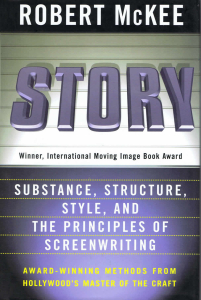Project Description
 Subtitle: Substance, Structure, Style, and the Principle of Screenwriting
Subtitle: Substance, Structure, Style, and the Principle of Screenwriting
By: Robert McKee
Notes:
Good writing fit as much content into as little space as possible.
Story is about originality, not duplication. Can explain in a pitch.
Good story: saying something the world wants to hear.
- Story is a metaphor for life.
- Story talent is rare. Literary talent is common.
- Make sure each scene adds value to the story.
- If a scene does not change the value of a character before and after the scene is done, then it should not be in the story.
- Another test: could the scene have been merge together. A play right typical combine scenes, because they can’t change easily.
- An Act: is a big story with huge significant, but that can be reversed.
- Only the last act is not able to reverse itself.
- Meaningful emotional experience.
A Story is one huge master event with many acts.
Failed Screen Play:
- Usually a personal story.
- Scene don’t change values.
Audiences don’t like the inconsistent realities of many true story elements (mini-plot and anti-plot)
- People generally want closure and things that fit neatly.
- People want stories to be consequently.
Four elements: Period of time; Location; Duration; Conflict.
Knowledge of one’s story is the only way to produce an original work.
- The smaller the world, the more complete the knowledge.
Limitations is the key to creativity.
To create a great story, make an occurrence to see “what if”. Shark eats a tourist = Jaws.
Irony in the conclusion is the most difficult to write, but it has the most lasting impact.
Stories that end with coincidence is meaningless.
Protagonist all have will power.
- They are also empathetic. Make the audience feel they are similar to this person.
Nothing can progress in a story without conflict.
- But crazy make believe conflicts don’t work.
- Soupopera, conflicts that only happen between people. They don’t have inner conflict.
Don’t make each scene turn the screw slowly.
- Vary things up to give the audience time to recover.
Climatic means intense change.
An ending must be both inevitable and unexpected.
- Inevitable: when an audience looks back through the story, the ending was obvious.
A protagonist can only be as compelling as the forces of antanism make them.
Show, don’t tell. Never force words.
Eliminate “is” and “are” throughout. Stories are in constant change.
Eliminate “we see” “we hear”.





Leave A Comment